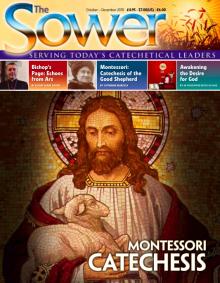This icon can be used for almost any teaching occasion. It is so familiar, so great, so rich and so much has been written about it. Nonetheless, in an ordinary parish situation, there will still be a great number of people, old and young, who haven’t been introduced to its beauty and its depths.
As explained in the art notes, it follows an event in the life of the patriarch Abraham from the Book of Genesis and links this to Christ’s revelation that God is Trinity. It is a perfect example of a biblical event being portrayed literally and, at the same time, with spiritual meaning. It is also a perfect example of the wondrous unity of the Faith.
This painting then is Trinitarian, Christo-centric and Eucharistic in that it depicts the eternal sacrifice of Christ at the Mass; it reveals the Paschal mystery as a beautiful, simple, eternal, Trinitarian act of divine love. Henri Nouwen says, ‘Rublev's icon gives us a glimpse of the house of perfect love’. Once explained it is often, appropriately, used for prayer. Since it was made for a Cathedral, however, its actual purpose is for the sake of enhancing our entrance into and appreciation of the liturgy of the Mass.
The rest of this online article is available for current Guild members.
This article is from The Sower and may be copied for catechetical purposes only. It may not be reprinted in another published work without the permission of Maryvale Institute. Contact [email protected]


















